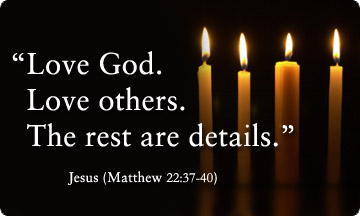XXX SUNDAY IN ORDINARY TIME - Matthew 22:34-40
During Jesus’ time, the group of the Pharisees had already a big influence over the people and that influence would grow stronger after the destruction of Jerusalem. With their single-mindedness about the Law, they managed to achieve the survival of the Jewish people and find a new way to keep alive the faith in Yahweh (the Lord), without the temple and without priests. Their ideals and their attitudes were very different from the ones of the Sadducees, who were traditionalists in questions of religion and collaborationists in political matters. The Pharisees were radicals and fundamentalists, being very strict in all matters concerning the Law. And that’s where they entered into conflict with Jesus, even though, in their ideals, they were the closest to Jesus. However, Jesus could not accept their strict legalism, which did not allow them to take into account the suffering of the common people. Confronted with Jesus who was led by the freedom of the Spirit, they saw in him an enemy and joined the Sadducees to get rid of Jesus.
Trying to put Jesus to the test, they approached and asked him a question: Which is the greatest commandment in the Law? And Jesus put forward a straight answer: There are only two commandments: the first and most important is to “love the Lord your God with all your heart, and with all your soul, and with all your mind.” And the second is “You shall love your neighbour as yourself.” In the end, there is only one commandment - the commandment of love, in which the love of God and the love of our neighbour go together. It is a fallacy to think that we may love God while ignoring the others with whom we live. How can we love God, if we do not recognise his image in the lives of our neighbours? How can we call God Father, when we do not accept the others as brothers and sisters?
In a way, it is very easy to be a Christian. We do not have plenty of rules and norms like the Jewish People. We have only one commandment, the commandment of love. And we will be judged by that commandment.
Nowadays, the word love is easily misunderstood with passion, pleasure and lust, which lead only to self-indulgence, which is selfishness, that is the opposite of love. True love leads us to pay attention to the needs of the others and gives us the strength to suffer for the benefit of the others.
In the first reading, taken from the book of Exodus, we are told how to behave towards all those who are in need of being supported and protected. In the Exodus, God points out three concrete situations in which are called to show love to the ones who suffer: the alien (the stranger), the orphan and the widow and the poor who borrowed money.
God reminds the people of the times when they experienced suffering and oppression because one they lived in foreign land and were treated as slaves, They are advised to do not the same to the foreigner living among them
Nowadays, there are plenty of people living far away from their homeland. Some emigrated in search of work and of a better life and they are ready to go through unthinkable trials in order to achieve that. Others are refugees who run away from persecution and war. They are welcomed in very few countries; they spend months (years) in refugee camps and are treated harshly. The first reading is a clear warning for all those who refuse to see in the alien - the emigrant and the refugee - a fellow human being, a child of God like them: one day, they will go through the same painful experience.
The orphan and the widow stand for all those who experience the loneliness and the struggle for survival. They need to be protected and defended. They need that we make ourselves their neighbours. We may remember the drug addicts or those who suffer from incurable diseases. They cannot be abandoned to themselves but need our compassion and our care.
Finally, the passage (Ex 22:25) deals with the money lenders, telling them that they should not demand interest; instead they must pay attention to the plight of the poor and God will listen to the cry of the poor.
How different is our society today, where high interest is demanded from all those in need, be it individuals or countries. The lending of money has become a big business, aiming at the highest possible profit. In the end, the money lending becomes a form of exploitation, forcing the poor into an abject situation, while the rich become ever richer.
Let us learn with Jesus to allow our hearts to be touched by the pain of others and to be compassionate with all those who suffer.

